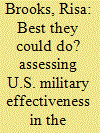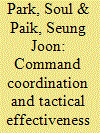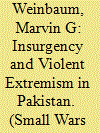| Srl | Item |
| 1 |
ID:
193056


|
|
|
|
|
| Summary/Abstract |
This article explores shortcomings in military effectiveness in the war in Afghanistan. It focuses on three sets of problems: the failure to resolve internal contradictions in the training effort, the failure to integrate political considerations with military activity, and poor strategic and operational/tactical integration.
|
|
|
|
|
|
|
|
|
|
|
|
|
|
|
|
| 2 |
ID:
158978


|
|
|
|
|
| Summary/Abstract |
This article analyzes the causes of combat effectiveness of the South Korean security forces through the course of its various counter-insurgency (COIN) operations from 1948 to 1953. We argue that improvements in two interrelated aspects ultimately resulted in higher operational and tactical level performance: unified operational command structure and the subsequent improvements in tactical efficiency under the guidance of the US advisory mission. Through an in-depth case study on how a nascent army improved its capacity in combating homegrown insurgencies, we demonstrate how the actual conduct of operations itself remains just as significant in the assessment of overall COIN outcomes.
|
|
|
|
|
|
|
|
|
|
|
|
|
|
|
|
| 3 |
ID:
188053


|
|
|
|
|
| Summary/Abstract |
This study quantitatively and qualitatively analyzes the impact and effectiveness of Turkey’s deterrence-oriented incapacitation effort throughout Turkey’s PKK conflict (1984–2018). By employing vector autoregressive (VAR) analysis, this study quantitatively finds that incapacitation did not reduce PKK violence over the long term and yielded a short-term counterproductive effect. Descriptive analysis asserts that while incapacitation had important mid-term deterring effects, it did not have any sustainable mitigation on the PKK insurrection. This is because, as this study argues, these deterrent impacts were not strategically converted into political gains/results. Considering the latest phase of the conflict, in which Turkey’s intra-state strife has become increasingly regionalized and lately internationalized in military and political terms with the emergence of the Syrian civil war, particularly the rise of the People’s Protection Units (YPG), this study claims that the sole application of an incapacitation-oriented eliminationist approach has become less relevant and less effective. The study suggests that deterrence should be considered within the strategic tit-for-tat game to force/compel the non-state actor to make the conflict more manageable by transforming it in a strategic way, in which strategy of deterrence is to be attached to visionary, long-term, and viable grand strategic political end-states and to be considered within the grand bargaining game.
|
|
|
|
|
|
|
|
|
|
|
|
|
|
|
|
| 4 |
ID:
152016


|
|
|
|
|
| Summary/Abstract |
Pakistan has an uneven history of dealing with insurgencies and extremism. This article identifies the various campaigns and policies employed to defeat militants and deal with violent extremism. It describes the major anti-state groups and how Pakistan’s military and civilian leaders, relying on the related strategies of selectivity, gradualism and containment, have allowed militancy and terrorism to thrive. This article finds that while the elites and the public may have belatedly come to appreciate the existential internal threats these groups pose to the country, there are strong reasons to doubt the state’s full commitment to its promises to take meaningful action.
|
|
|
|
|
|
|
|
|
|
|
|
|
|
|
|